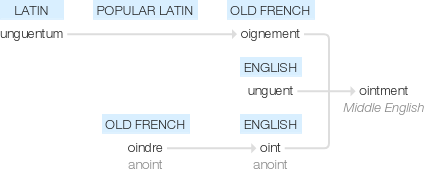Ointment
Middle English: alteration of Old French oignement, from a popular Latin form of Latin unguentum (see unguent); influenced by obsolete oint ‘anoint’ (from Old French, past participle of oindre ‘anoint’).
wiktionary
A later form (as if oint + -ment) of Middle English oinement, borrowed from Old French oignement(“an anointing”), from oigner, oindre, ongier(“to anoint”), from Latin ung(u)ō(“I anoint”), from Proto-Indo-European *h₃engʷ-(“to smear, anoint”).
etymonline
ointment (n.)
"unctuous medicinal salve for external application," late 13c., oynement, from Old French oignement "ointment, salve, unguent," from Vulgar Latin *unguimentum, from Latin unguentum (see unguent). The first -t- emerged early 14c. in English, from Old French, which got it by influence of oint, past participle of the verb oindre "to anoint."
